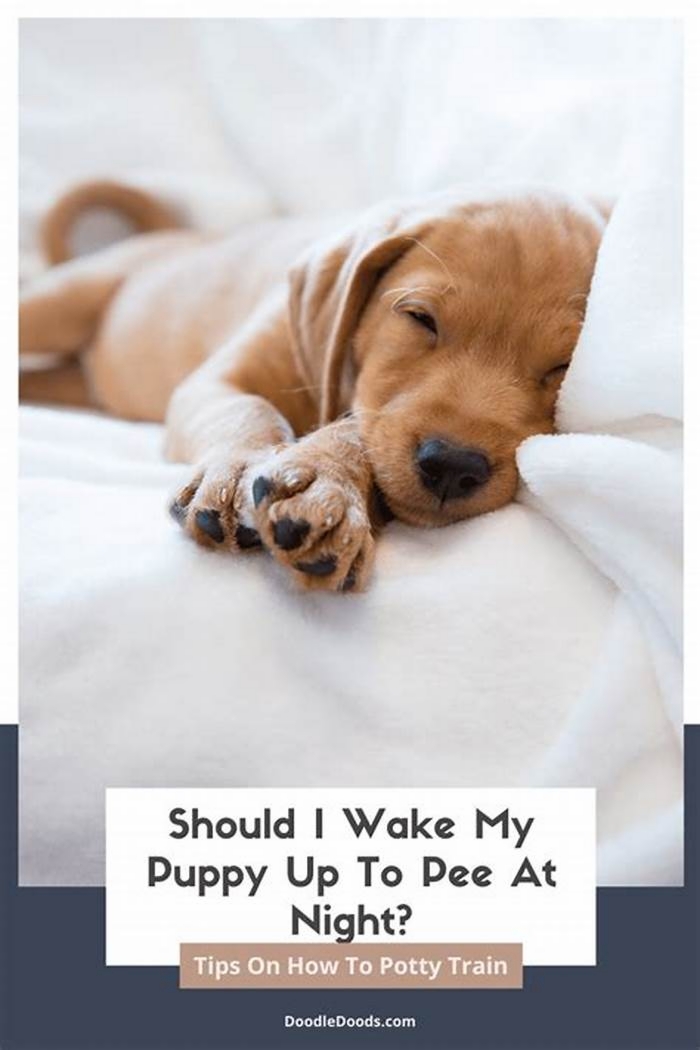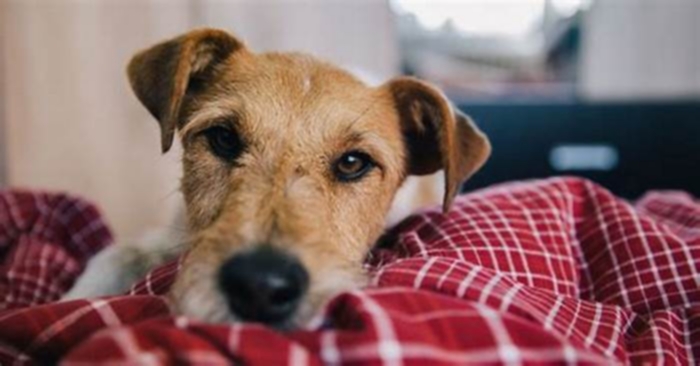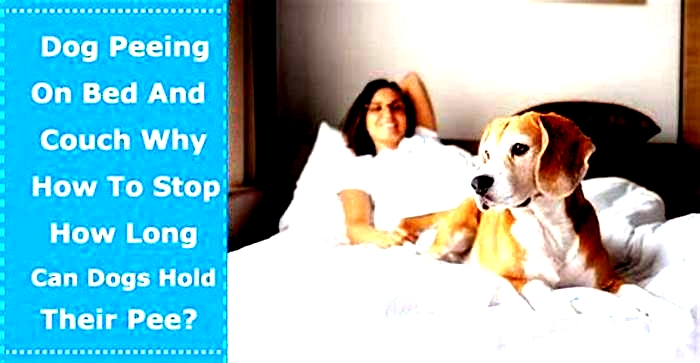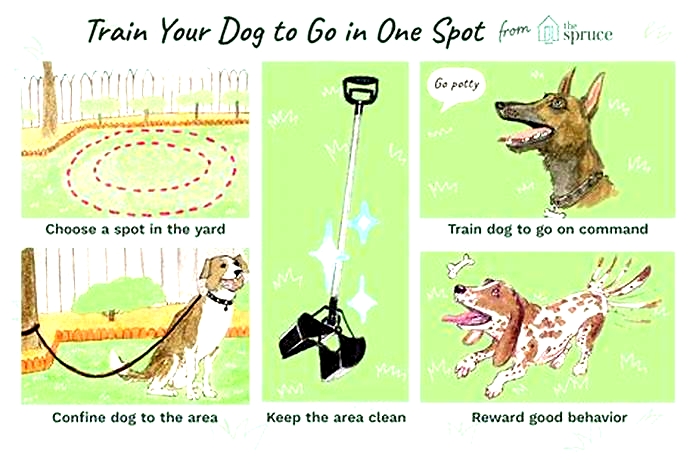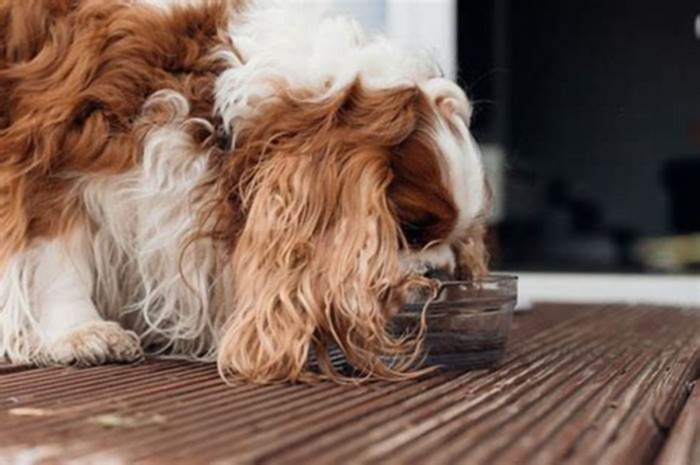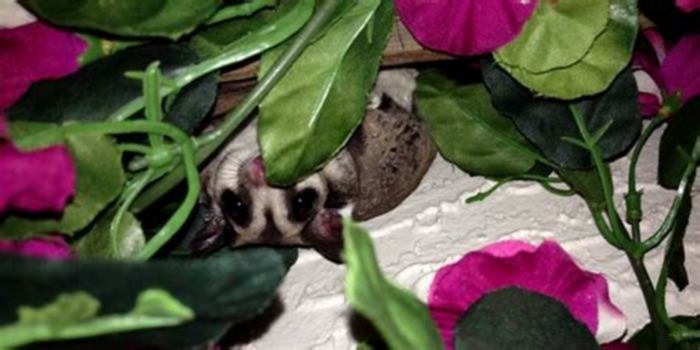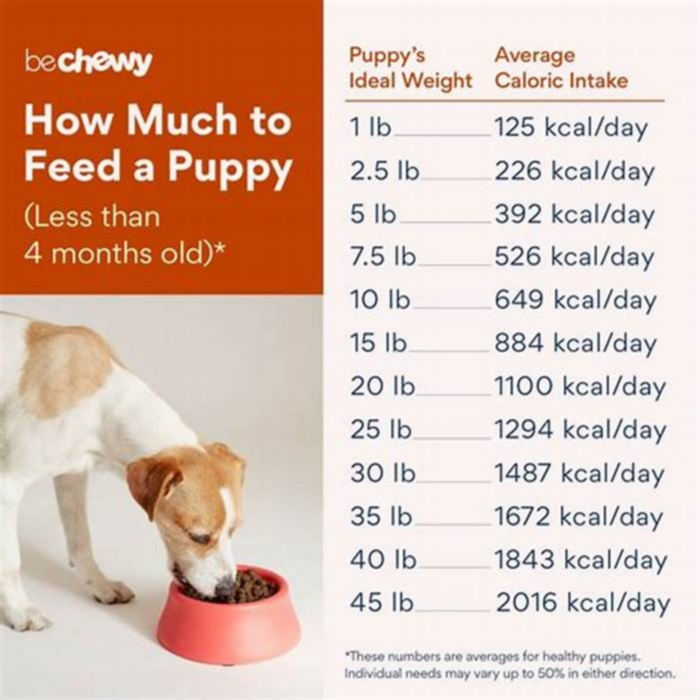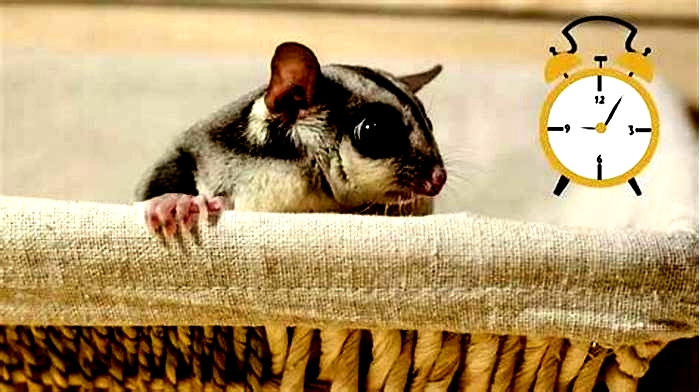At what age can a dog go all night without peeing
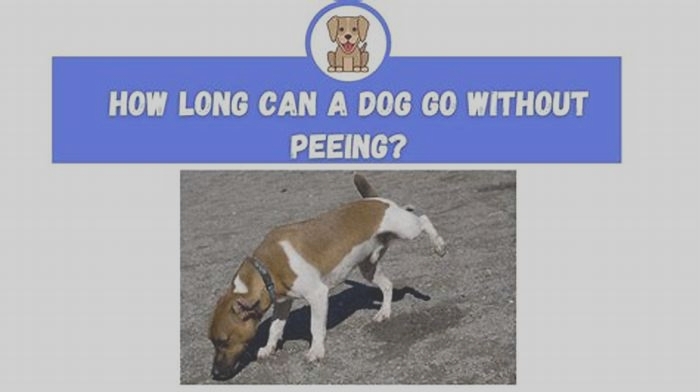
How Long Can A Puppy Go Without Peeing At Night?
A new puppy is a bundle of joy, at least during the day when you can play with him, teach him tricks and cuddle him. A dream come true.
Except when the night comes and getting out of bed to take care of the dogs needs becomes a nightmare.
Nobody wants to go out of their nice warm bed to take the puppy out for a potty break. The good news is that if you keep to a constant routine and are quite firm about it, you will both soon be able to sleep through the night peacefully.
Lets see what you can expect during your first weeks with the new pup and what you need to do to teach him proper nighttime manners.
How long can a puppy go without peeing?
Theres no point explaining or complaining to your cute puppy that you need to get to work in the morning and simply need to get some sleep.
For the first weeks of your life together be prepared to wake up at least once during the night to take the dog out for a quick pee. Dont wait until you hear the puppy whining, barking or scratching to signal he needs to go potty.
Set the alarm halfway through the night, drag yourself out of bed, wake up the pup and take him to the designated potty area.
Experts say an 8-week old dog can go without peeing for roughly four or five hours, but, of course, every pet is unique so the best way to determine the time you should set the alarm is trial and error.
If your dog soils his bedding before your scheduled nighttime potty break, you should set the alarm one hour earlier and see how that goes.
On the other hand, if you wake up to find your dog sleeping peacefully and he looks at you like youre some sort of a maniac for disturbing his sleep in the middle of the night, you can safely set the alarm 15 minutes later the following night.
Or even 30 minutes if youre feeling particularly lucky. In case your new furry baby had an accident, remember it was your decision to test the limits so dont blame the poor thing as he has literally no control over these matters and well explain why.
How often does a puppy need to pee?
The problem with puppies is that they have tiny bladders so theres not much room to hold it in. At the same time, just as babies, puppies have technically no control over their elimination process.
To be more specific, they cannot control the muscles that activate the sphincter of their bladder. It is something they will master with time, but at 8 weeks puppies cannot force themselves to keep it in until the next potty break.
According to the Humane Society, you can calculate how long a pup can hold it judging by their age in months. For instance, a one month old pup can go one hour without peeing. At two months, he should be able to keep it in for two hours and so on.
As to how many times does a dog need to go potty, some go as far as saying 24 times per day. Now, dont panic, that doesnt mean you should take your new puppy to the garden for number one every single hour.
You need to take into account that most of the bathroom breaks occur during daytime and, depending on his activity, your pup will pee several times in the space of one hour. To understand how this works lets have a look at the ideal daily routine you should set.
The puppy potty routine
The first few weeks with a new puppy are all about training, especially housebreaking. If you want to have a happy life together for many years to come, you need to set a routine and keep to it at all cost. You have to make it clear to the dog that, for him, the bathroom is outside and he is not to pee on your carpet. For this, you must take him outside every time he needs to pee or poop and there are plenty of such times during the day.
Wake up
Just as you go to the bathroom as soon as you get out of bed, so should your dog. So, first thing in the morning take the dog outside to do his business. Coffee can wait!
Feeding time
If adult dogs only require two meals per day, a puppy needs to eat three or four times a day. Lets say you give him breakfast right after the early morning potty break. Now, as soon as hes done eating you must take him outside again even if youve done that not 15 minutes ago. Eating stimulates the digestive system so he will want to poop and pee again. Keep to a regular feeding time as puppies, just like babies, need order in their life.
Play time
Young dogs need training and plenty of mental stimulation. A very young puppy will be so excited he might need to pee during playtime so if the weather allows it play with him outside and take him to the potty spot as soon as he shows signs of needing to go.
Nap time
Puppies need to sleep 18-20 hours a day. After a play session, your little one will be exhausted and he will take a nap which might last anywhere between 30 minutes and two hours. The moment he wakes up, its time for another potty break. Then its feeding time again and after that you must take him outside once more and so on.
Night time routine for your puppy
If the daytime program seems exhausting, take heart, you dont have to keep doing this overnight as well.
Here are the steps to take to keep nighttime potty breaks and accidents to a minimum.
Withhold food and water a couple of hours before bedtime
Your pup might object to that and whine a little, but he doesnt really need food after sundown. Less food and water in his system means he wont have to go during the night.
Last-call potty break
Get yourself ready to sleep, change into your pyjamas and then wake the puppy whos probably already asleep and take him to his potty spot. Tell him to go potty or whatever command you use during training.
Crate your dog for the night
Experts believe using a crate is useful during this stage in your puppys training as he wont want to soil his sleeping area. By nature, dogs dont like to sleep in their own waste anymore than you do. With this in mind, make sure that the crate is not too big, thus allowing the dog to use the extra space as his personal bathroom.
If theres not enough space to go potty without having to sleep in his own mess the puppy will try not to. However, dont count on it because, as weve said, he cannot really control his bladder. Furthermore, you shouldnt make the puppy keep it in for long periods as this can lead to urinary infections.
Nighttime potty break
When you wake up in the middle of the night to take the puppy outside you certainly wont want to waste too much time. Nor should you. Teach the puppy from the very beginning that its strictly business. A well-rested dog might take it into his head its playtime. It isnt. Keep the lights dim or as dim as possible without stubbing your toes, grab the pup and take him to the potty spot. Tell him to go potty and take him back to his crate as soon as hes done. In most cases, at that ungodly hour hell only need a quick pee, as dogs rarely feel the need to poop during the night.
You dont need to bother with a treat at this hour as this might keep him awake. A quick pat on the head will do, then put him back to bed. Chances are hell be fast asleep before you get back to bed yourself.
If taking the dog outside for a potty break in the middle of the night is not an option for you use a litter box or at least an area covered with newspapers in the bathroom. Its not ideal, but as the puppy grows older he will have less need for a nighttime potty break and you can get rid of the litter box.
Getting rid of nighttime potty breaks
As your dog grows older set the alarm slightly later to see if he can hold it. In case of an accident return to the previous schedule and try again in a week or two. With time, your pup will be able to sleep through the night without any accidents. Expect this to happen when your dog is around five months old. Some dogs can sleep for eight hours without needing to pee by the time theyre four months old, while others only master this when theyre six months old. Sometimes its just the way your dog is, but in some cases maybe you werent consistent enough with housebreaking your dog.
Bottom Line
An eight-week old pup cannot possibly be expected to hold it in for more than two hours during daytime. At night, your puppy will need one potty break. Set your alarm for a time halfway through the night and take the dog outside for a quick pee. Keep it quick and boring, as you dont want your dog to get any ideas into his head. Return the dog to his crate and go back to bed without a word.
Increase the interval slowly and by the time your pup is five months old he should be able to sleep soundly and you can forget about getting up at all hours! Well done both of you!
How Long Can a Dog Go without Peeing? The Truth!
When nature calls, its best not to ignore it, right?
Its easy to forget the importance of bathroom schedules when people can take a break whenever they need to.
On the other hand, our dogs rely on us to provide access to the toilet.
Whether its the backyard or the park, its all on us to make sure our fur babies have adequate potty routines.
See also:
Well-trained dogs are pretty good about letting us know when they got to go.
In a perfect world, we would take them outside before they get in dire straits and do something like pee on your bed right in front of you!
Keeping everyone happy means maintaining a decent schedule.
How often do dogs and puppies need to go outside to pee? How long can a dog hold its pee?
Its not complicated, but there are some things you can learn to help figure out how often your dog needs a bathroom break.
Puppies
There is an easy rule when it comes to house training and caring for puppies.
For every month of age, they can hold their bladder forabout an hour.
You can think of this relationship as something like this:
Puppy Bladder Control Chart | |
Age (in months) | Duration of Bladder Control (in hours) |
| 2 | 2 |
| 3 | 3 |
| 4 | 4 |
| 5 | 5 |
And so on.
This means that an eight-week-old puppy (the minimum age a puppy should be adopted) can hold themselves for two hours at best.
This applies to overnight hours too.
Parents of new puppies can expect to get up several times during the night to let the puppy out or face cleaning up a mess come the morn. See our list of the best dog urine cleaners for that!
There is a light at the end of the long, exhausting house-breaking tunnel, however.
Once most puppies reach 6-8 months, they can sleep the night through without needing to urinate.
Most puppies can be expected to be fully in control of their bladder and bowels by the time they reach a year.
Puppies often pee inside because they dont know any better.
Getting on a consistent potty schedule will make your life and theirs much easier.
Before they learn, they will pee the moment they feel the need to.
So its time to think a few steps ahead of them and get them outdoors before the urge strikes.
The sooner they pee outside, the sooner you can praise and reward them for this behavior.
The sooner they will understand that the grass is the place to go.
So how often do puppies pee?
It depends on their age, but younger ones will need to go outside up to eight times between waking up and bedtime.
Remember the rule they can hold it an hour for every month of age.
So when they get older, that number will decrease.
Eventually, they will reach the point where they wont need out more than 3-5 times daily.
Puppies do well when let out first thing after they wake like with adult dogs.
But dont forget that puppies nap quite a bit throughout the day, so ushering them to the backyard each time they wake up is a wise move.
They will usually need to do their business shortly after eating and drinking, so try to schedule potty breaks after meals as well.
Adult Dogs
Fully-grown and house-trained dogs are often expected to go 8-9 hours without using the bathroom.
Of course, just like us, it depends on how much water theyre drinking.
Its important to gauge how often they go against how much water youre giving them.
If they can go longer than 10 hours and when they do, their urine is darker, for example, its a sign they arent getting enough water.
So many people work full-time jobs that keep them away from home for most of the day, and dogs can get used to this kind of schedule.
Is this okay, though?
Generally, yes its fine to expect an adult dog to go this long during the day without peeing.
It depends a lot on the dog and the environment, but most dogs can hold it in for the duration of a typical workday.
They can often hold it in for longer than that but it isnt something you want to ask of them regularly.
Having a dog hold their urine for too long and too often will put them at risk for infections and other health issues.
If you notice your dogs urine smells fishy, or their urine has mucus or, worse, has the presence of urine crystals, there is already a problem brewing.
Whats more?
It can also set them up for incontinence later in life.
Evenly-spaced, consistent potty breaks are best.
And for your house, you raise the risk of accidents where urine stains and smells have to be removed from carpets, valuable hardwood floors, irreplaceable wood furniture, and sometimes your subfloor if repeated mishaps occur.
How often do dogs need to pee?
Dogs need to empty their bladders3-5 times a day. Ideally, you would let them out ever 3-4 hours, but work schedules dont always allow it.
Does that mean you need a pet sitter or to send your pup to doggie daycare?
Not necessarily you can still get those 3-5 breaks in on workdays. One of the first things a dog needs in the morning is to be let outside.
When you come home from work, they should be let out first thing theyve been holding it all day.
Getting another 2-3 bathroom breaks in before bed is pretty easy, especially if an evening walk is on the agenda.
Not everyone works a typical 9-5 day, but the general idea can apply to most schedules. Dogs adapt quite easily.
Elderly Dogs
Older canines can be a special case when it comes to bladder control.
What makes a dog geriatric?
Breed plays into biological age when it comes to dogs, as does their size.
Giant breeds such as Great Danes, Bernese Mountain Dogs, and Mastiffs can be considered elderly at 6-7 years old.
Mixed breeds similar in size will have roughly the same lifespans most dogs in the 75+ lbs range are elderly by 6-7.
Smaller dogs think Corgis, Terriers, and small hounds will be elderly, around 8-9 years old.
Toy breeds, which have some of the longest lifespans of any group of dog breeds, arent usually classified as elderly until they reach ten years or more.
When your dog reaches this stage of life, their needs can change. Diet, exercise, and potty routines can differ.
An old dog might suffer from incontinence and dribble urine indoors when theyre in between bathroom breaks. For example, youll see this when they leak urine when lying down.
Some canines can develop dementia, which frequently causes them to urinate inside.
Even if theyre not confused, older dogs can benefit from a bathroom schedule.
You might find it helpful to take them out more often the routine might resemble the one you set for them as a puppy.
An elderly dog will also have a harder time holding their bladder for long stretches.
Even if they were used to going eight hours or more without peeing in the past, its not something you can expect of them.
The Solution to Urine Pollution
Its fair to expect an adult dog to hold their bladder while youre at work provided you dont work long shifts.
Anything over nine hours is pushing it and making your dog uncomfortable in the meantime.
And while dog urine may not be harmful to humans, youre definitely pushing your luck for regular accidents happening in your house.
None of us wants to live with that!
Remember,they dont want to pee on the floorany more than you would.
If you have long shifts, its better to rely on a pet sitter, trusted friend, or family member to give your dog a short break.
Even a 5-10 minute recess is enough to hold them over while you finish that double shift at work.
What if you have a puppy or a senior dog?
Youll want to be sure someone can step in and let them out a few times a day.
Crating them or putting diapers on them will avoid a bigger mess, but its not solving the root problem.
Diapering puppies can also negatively affect house training, including the risk of urine scald, so that option should be used as a last resort.
An elderly dog or any dog with health issues that include incontinence can be helped with diapers, but you should also provide regular trips to the bathroom.
We all Wee
It can be easy to forget how much our dogs look to us for their basic needs.
They can be very clever, independent animals, but they still need our help with many things.
Keep in mind that dogs have bathroom needs similar to ours, and their health relies on being able to depend on us to look after them.
How long can a dog hold its bladder?
Every dog is different, but leaving them alone while youre at work, shopping, or having an evening out is usually no issue.
The best practice when you have to leave them for long periods is to take them out right before you go and as soon as you get home.
If you leave your dog too long, youll find out exactly how long they can hold their pee which is why we do not recommend this experiment at all!
Ask someone you trust to look in on them if all else fails. Your dog and your carpet will thank you.

